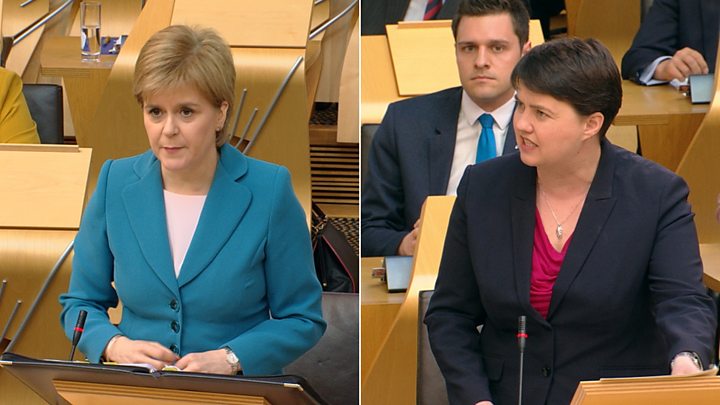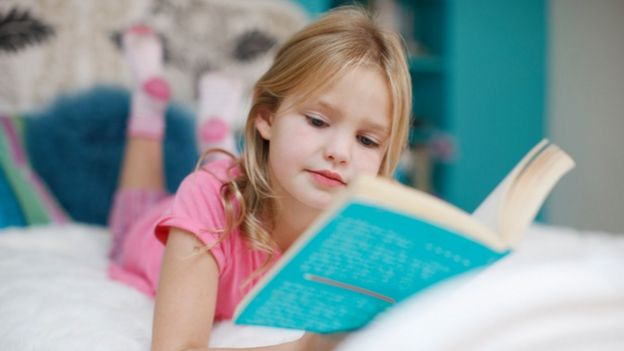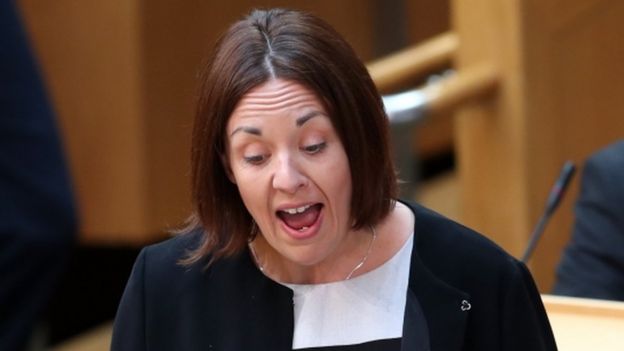Nicola Sturgeon ‘determined’ to improve education
 Nicola Sturgeon has said that falling literacy standards in Scottish schools made her “utterly determined” to press on with education reforms.
Nicola Sturgeon has said that falling literacy standards in Scottish schools made her “utterly determined” to press on with education reforms.
The latest Scottish survey of literacy and numeracy showed reading and writing skills have declined.
Scottish Conservative leader Ruth Davidson asked whether the first minister was “embarrassed, ashamed or both” by the statistics.
Ms Sturgeon said she would “carry on with the changes we’re making”.
The literacy statistics, which were published by the Scottish government on Tuesday, showed that fewer than half of Scotland’s 13 and 14-year-olds are able to write well.
The writing performance of P4 and P7 pupils has also dropped, while the reading ability of P4, P7 and S2 pupils remains broadly similar to 2014 – but lower than 2012.
Deprived pupils
And there has been no reduction in the big gap between the performance of the country’s wealthiest and most deprived pupils.
Speaking during first minister’s questions, Ms Davidson said: “Today in Scotland in an S2 class of 30 pupils, on average, five can’t write properly. That’s double the number just four years ago.
“When the first minister sees statistics like these does she feel embarrassed, ashamed or both?”
Ms Davidson added: “We like to pride ourselves in Scotland that our education system was the best in the world and after 10 years of this SNP government, we can do so no longer.”
 Image copyrightGETTY IMAGES
Image copyrightGETTY IMAGESMs Sturgeon responded: “What I feel is utterly determined, determined to carry on with the changes we’re making in Scottish education so that we continue to see the improvements in attainment and progress in closing the attainment gap.”
The first minister said she was not going “in any way to diminish the significance” of the SSLN findings.
But she argued the study was a sample that measured S2 pupils against the standard they are expected to reach in S3.
Trainee teachers
In contrast, she said, the government’s “comprehensive” national improvement framework data showed more than 80% of S3 pupils were meeting the required standard.
Ms Sturgeon was also pressed on evidence taken on Wednesday by Holyrood’s education committee, which heard that trainee primary teachers are graduating without sufficient skills to teach maths to P7 pupils.
“We’ve not enough trainee teachers coming through and the ones who are aren’t being taught properly,” Ms Davidson said.
“That’s not their fault, but if they’re not getting the proper instruction, what chance do they have of teaching our children?”
 Image copyrightPA
Image copyrightPAThe first minister said the government had increased the intake into teacher education and pointed out the content of teacher education was a matter for universities, with four Scottish universities ranked in the top seven across the UK for teacher education.
She said: “We’ve got good performance across education in Scotland but there are areas where we have recognised that we need to do better and this government is getting on with the job of taking the action that will deliver these improvements.”
Liberal Democrat leader Willie Rennie also pressed the first minister on the “poor statistics” on education.
He told Ms Sturgeon he had met a mother worried about her 15-year-old son’s future as he is struggling with reading and writing.
Mr Rennie said: “She is anxious about his future but she is also angry with the SNP, who have been in charge for the whole of her son’s education.”
Locum doctors
Meanwhile, Scottish Labour leader Kezia Dugdale highlighted vacant consultant posts in the NHS, which she said had risen six-fold in five years, resulting in increasing use of private-sector staff.
Ms Dugdale produced figures showing that consultant posts vacant for six months or more rose from about 30 in December 2011 to 180 in December 2016.
The Labour leader also cited a newspaper report revealing a £400m deal with agencies to supply locum doctors.
The spend comes at a time when nurses are more likely to leave the NHS because of low pay, she added, and claimed the empty posts and private-sector spending reflected a decade of “mismanagement” of the health service under the SNP.
Labour calls for a 1% pay cap for nurses to be lifted were defeated during Wednesday’s parliamentary vote, with the Scottish government voting against.
Nicola Sturgeon said pay restraint had come as a result of “an extremely tight public spending environment”, adding that private-sector spending fell last year, accounting for only 0.7% of the resource budget for health.
Ms Sturgeon said: “We have taken action to make sure that we are treating workers in our NHS as fairly as possible. Unlike governments elsewhere in the UK, we have targeted low pay.
“And we have also made sure that we have always accepted recommendations of the pay review body.”
[“source-bbc”]